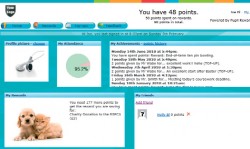Contact: pupilrewardpoints.co.uk
Reviewed by: John Dabell
Ofsted once said that staff need to do twice as much praising as complaining. Rewarding pupils for effort, courtesy, punctuality or good attendance has been fashionable for years now but it is often inconsistent across school settings, and quickly devalued. If a reward system is well thought out and applied in a climate of incentive, however, then misbehaviour isn’t seen as the number one route for getting attention.
Lawford Education Ltd has focused on designing the ideal reward system for schools in order to save teachers’ time and motivate young people to achieve points using a computer, mobile phone or top-up voucher. It has been cleverly created and boasts some great features.
All staff and students have their own login (the home page can be customised to match your school’s colours and corporate identity). It’s simple to use; as a member of staff, type in a student’s name, identify your subject, and decide how many points you are giving, selecting from a list of reasons or entering your own. An upper ceiling will need setting though, and common ground reached as to how many points should be awarded for excellent work so that consistency can be achieved. A daily or weekly points budget for each member of staff can be set and is probably a sensible route to take. You can also award points to a whole class and this can be shown on a whiteboard during a session. If a computer is out of reach then top-up vouchers can be printed out in advance, and work just like mobile phone top-ups – students just enter a code to add the points to their account. It’s quick, easy and brilliant. Points means prizes, of course, and it’s down to individual schools to decide what rewards to give out, but ideas include iTunes vouchers, high street vouchers, books, DVDs, stationery, sports equipment, tickets, charity donations, memory sticks, and so on.

From a student perspective, when pupils login they can see details of their achievements at a glance, check their attendance, set targets, chart their progress and performance across different subjects, save points and buy rewards. It has a nice feel to it and operates pretty much like a social networking site, which is bound to be popular. Learners can add a profile picture, change their background and add friends to their page, seeing details of their achievements too. Messaging is an optional feature but although it can be switched off during school hours, the comments still need policing, so you might feel this particular facility to be unnecessary.
One thing I would like to have seen is a parental section. Information on how parents can keep tabs on their children and get involved (perhaps through linking pocket money) is surely an opportunity there for the taking. And a presentation to parents is much needed in the School Resources section of the website.
For this reward system to work, teachers have to be singing from the same hymn sheet. Those who are promiscuous with merits and dish out rewards at the drop of a hat to keep kids quiet can do more harm than good, which is why a whole school approach is vital. Rewards can be rewarding, but only when they have genuine meaning, which is why it is reassuring that Lawford Education Ltd has produced a spreadsheet to help guide your school through making key decisions about how things should be structured.
The hard part will be convincing your colleagues that this system works. Not everyone will be eager to get on board, particularly seasoned campaigners who have seen it all and got the Purple Hearts and scars to show for it. But this system is worth promoting because it can deliver the goods and make a difference. Other web-based learning systems are available, of course, and it’s worth making comparisons to ensure you get the best fit for your school population and your staff.
Taking steps
STEPS Professional Development, a not-for-profit organisation owned by Edith Cowan University of Australia, has been delivering training to UK teachers based on the award winning First Steps resources in literacy and mathematics for years. The company’s considerable experience has now led to the creation and upcoming launch of REALsteps, enabling teachers to drill down to focused areas of need; and the launch of Friendly Schools Plus, shown to significantly reduce incidents of bullying.
All STEPS resources are developmental in nature, research based and easy to adapt. Courses crystallise the best thinking in subject areas and improve teacher professional judgment. (STEPS Professional Development, 01793 787 930, stepspd.com)
Verdict:
Point taken
A secure, reliable and simple system that has the potential to transform the reward culture of your school. You have complete control, no technical knowledge is required and motivation is all but guaranteed. 100 points!










